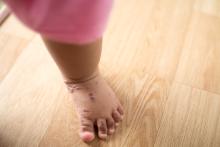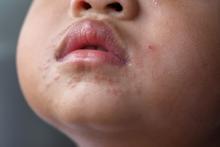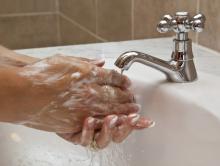Hand, Foot, and Mouth Disease
Hand, foot, and mouth disease (HFMD) is caused by viruses that spread year round. Anyone can get HFMD, but most cases occur in infants and young children during the summer and fall. On rare occasions people with the virus that causes hand, foot, and mouth disease may develop viral meningitis.
HFMD is usually not serious, but it can spread quickly, especially in schools and day care centers.
HFMD 101
You can get HFMD by:
- Having contact with respiratory droplets from a sick person's coughs or sneezes.
- Touching a sick person (such as kissing, hugging, or sharing cups or eating utensils).
- Touching poop from a sick person (for example, when changing diapers).
- Touching objects and surfaces that have the virus on them (such as toys, doorknobs, and tabletops).
-
Most people with HFMD have flu-like symptoms, mouth sores, and a skin rash.
- Mouth sores are usually painful and often start as small red spots on the tongues and inside of the mouth. Infants with mouth sores may stop nursing and become dehydrated.
- Skin rash usually shows up on the hands and feet. It can also appear on the buttocks, legs, and arms.
- The skin rash looks like raised red spots that can also turn into blisters. The fluid inside blisters can contain the virus that causes HFMD.
- Other symptoms of HFMD include:
- Eating or drinking less
- Fever
- Feeling unwell
- Sore throat
Most people with HFMD get better on their own in seven to 10 days. Taking over-the-counter medicines can relieve fever and pain caused by mouth sores. Drinking plenty of liquids can help prevent dehydration.
Children with HFMD may continue to go to day care and school if they are fever-free, have no uncontrolled drooling with mouth sores, and feel well enough to attend. In some cases, children may need to stay home to control and outbreak of HFMD.
Contact a doctor or other health care provider if your child is younger than 6 months old, not drinking enough to stay hydrated, or if their symptoms are severe or last longer than 10 days.
-
Wash your hands often with soap and water for at least 20 seconds. Be sure to wash hands before and after caring for someone who is sick and after:
- Changing diapers
- Using the toilet
- Blowing your nose
- Clean and disinfect frequently touched surfaces and items, including toys and doorknobs.
- Avoid touching your eyes, nose, and mouth with unwashed hands.
- Avoid close contact with sick people, such as hugging or kissing them.
- Department of Health Services: Hand, foot, and mouth disease fact sheet, P-42051 (PDF)
- CDC (Centers for Disease Control and Prevention): Hand, Foot, and Mouth Disease information
Questions about hand, foot, and mouth disease? Contact us!
Phone: 608-267-9003 | Fax: 608-261-4976




